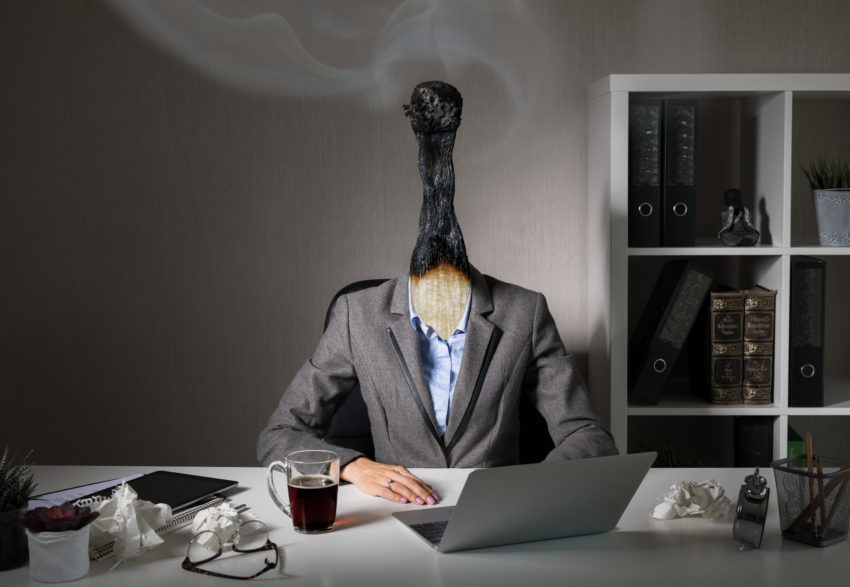With WFH becoming the new normal, it’s not surprising that many of us are feeling the strain of working from the same space we’re living in.
For several months now, many of us have been confined to working and living in the same exact space in our homes. We’ve all been in and out of lockdown, and on the edge of a spiralling global economy as a result of the pandemic.
It goes without saying that the arrival of COVID-19 has shifted how—and where—we work, dramatically. While some have been furloughed or made redundant, causing anxieties of their own, a large proportion of people are having to work from home or in extraneous circumstances. As a result, those who have continued to work over the past eight months are increasingly exhausted. An August survey found that 58 per cent of US workers reported feeling burnt out, an increase of almost 15 per cent since March, while another survey found that 60 per cent of people felt they had been working more hours since restrictions came into place.
What is lockdown burnout?
Prior to global lockdown, we were already living in the age of ‘workism’, the belief that work is not only necessary to economic production but also an essential part of one’s identity. “Work ethic is valued above all else”- The more excessive, the more we seem to value it.
At a time when socialising is forbidden, shops, gyms and restaurants are still shut, and we are confined to our homes, for those of us who have it, work has taken on ever more heightened importance. With little else to do, particularly by way of leisure time, work has become a lifeline—providing us with a sense of meaning and normality.
Furthermore, lockdown has increased job insecurity, meaning there is more pressure than ever to perform in a work context. “If our jobs are precarious,” as so many are during this time, we might operate in a constant state of dread of losing our incomes.
Then there is the problem of working from home—a privilege in many ways, but one that also comes with serious psychological pitfalls. A lack of routine and structure, distraction from children, family and flatmates, constant anxieties about the spread of the virus and uncertainty of the future have made working productively with focus and efficiency very challenging. When external structures fall away, we are in danger of thinking we should work all the time, feeling guilty if we cannot do so. Work then begins to bleed into our days and even nights, eroding any opportunity for recharging.
Indeed, in the absence of the feedback, validation and approval we would ordinarily get from face-to-face interactions from colleagues and senior team members, working from home alone means we become our own overly critical bosses. Often people work more and harder from home, self-policing in a way that is much stricter than any external management expectations would be, explaining that this feeds a perpetual cycle of stress and anxiety, which not only has a negative impact on our work but more importantly on our wellbeing.
Who does lockdown burnout affect?
Burnout can affect anyone, however, some groups are more susceptible, particularly those in the caring professions. Research from 2018 found two out of three doctors in China were suffering from burnout, while a US study found that 78 per cent of physicians were struggling. Elsewhere, 2019 data shows medical professionals in Jamaica and Canada also have burnout symptoms while the rate of staff leaving the UK’s NHS due to excessive stress nearly trebled over the past seven years—and this was all before COVID-19.
One can only imagine the ways in which the pandemic has exacerbated these struggles. In fact, new research from China highlights the scale of the impact on frontline nurses, meanwhile, as more people are hospitalised with the virus in the US, experts suggest health workers are potentially reaching psychological breaking points.
What’s the solution to lockdown burnout?
The obvious answer is self-care or pre-emptive self-care, which is to say, replenishing mental and emotional reserves before burnout hits. Indeed, going easy on ourselves and listening to our bodies can all help us cope with the pressure to be productive during this time. Establishing clear work-life boundaries and routines. Establishing a clear beginning and end to the working day with regular breaks throughout as well as finding other ways to switch off from work stressors such as turning off your work emails or notifications to create a clearer division.
However, self-care isn’t easy, and has itself become another project on our to-do list. The problem is that we tend to see almost everything as work these days—relationships, parenting, self-care. We measure our actions and thoughts in terms of investment of energy and effort and outcome. Indeed, framed in terms of self-optimisation, the modern pressure to look after ourselves and pursue wellbeing can become as exhausting as the problems that are contributing to our ill-health in the first place.
Instead, if we truly seek to prevent burnout, we need to change our attitudes to work. We need to stop overinvesting in work, expecting it to deliver salvation and meaning, and detach our deeper purpose from it. We must recalibrate our cultural fixation on productivity and instead seriously consider the role wellbeing can play in the workplace. For now though, as we flit between lockdowns, we must all be reminded of the critical importance of self-compassion.

